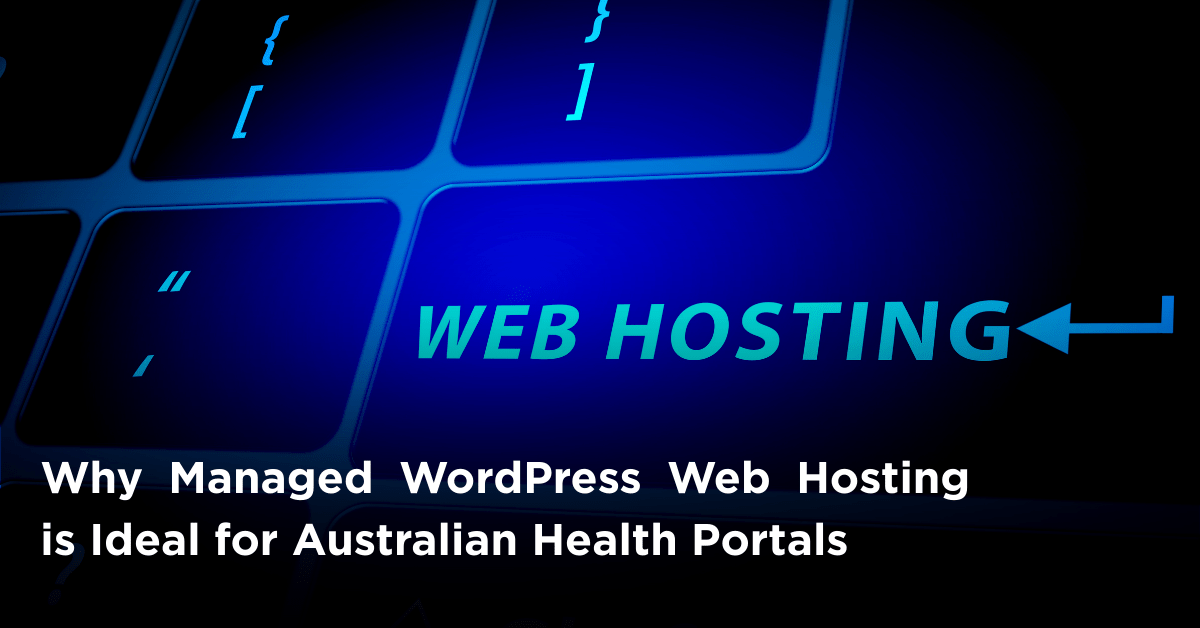In today’s modern digital age, even small businesses can easily look like big brands. The…

Why Managed WordPress Web Hosting is Ideal for Australian Health Portals
Think about the last time you booked a doctor’s appointment. Chances are, you didn’t call the clinic and sit on hold. You probably jumped online, clicked a few buttons, and locked in a time that suited you. That’s the reality of healthcare in Australia now—most of us expect to do things digitally.
From checking blood test results to attending a telehealth consultation, health portals are slowly becoming as important as the clinic itself. They save patients time, reduce admin work for staff, and make healthcare feel more connected. But here’s the problem: if those portals don’t load quickly, or worse, crash when people need them most, the whole system starts to break down.
Let’s be real—when you’re sick, the last thing you want is a 502 Error page staring back at you. Patients don’t care why the site failed. All they see is that it failed. And once trust is shaken, it’s hard to win back. That’s why hosting isn’t just some technical choice in the background. For healthcare providers, the hosting platform is the backbone of the entire patient experience.
This is where Managed WordPress Web Hosting comes into play. Instead of leaving clinics and hospitals to juggle updates, security patches, and performance tweaks, managed hosting takes care of all that behind the scenes. The result? A health portal that patients can rely on, whether it’s 2 p.m. on a busy Tuesday or 2 a.m. when someone wakes up panicked about test results.
What is Managed WordPress Web Hosting?
Let’s not overcomplicate this. Imagine you own a car. You’ve got two options:
- Do all the maintenance yourself—oil changes, tyre checks, brake repairs.
- Pay for a service plan where a mechanic handles everything.
Which one sounds easier? Most of us would take option two, right?
That’s essentially the difference between standard hosting and Managed WordPress Web Hosting. With standard hosting, you’re responsible for updates, backups, and troubleshooting. With managed hosting, your provider acts like the mechanic. They handle the technical stuff so your website just… works.
Here are a few things typically included in managed hosting packages:
- Automatic updates – WordPress, plugins, and themes are kept current without you lifting a finger.
- Daily backups – If something goes wrong, you can roll back to a clean version in minutes.
- Performance tuning – Servers are optimised specifically for WordPress, which means faster loading times.
- Security monitoring – Firewalls, malware scanning, and DDoS protection guard sensitive data.
- 24/7 support – Real humans you can call or message when things go wrong.
For a normal business website, those features are convenient. For a healthcare portal, they’re critical. Think about it: a florist’s website going offline might mean a few missed flower orders. A health portal going offline could mean a patient can’t access vital information or book an urgent appointment. The stakes aren’t even in the same league.
And here’s something that often gets overlooked: speed. Patients in Sydney expect the same quick experience as those in regional Queensland. If your host isn’t set up properly, that’s not going to happen. Many managed hosting providers use cloud-based web hosting and global CDNs (Content Delivery Networks), which help distribute data across multiple servers. That way, whether someone’s logging in from Melbourne or Alice Springs, the portal responds quickly.
So, to put it simply: managed hosting is less about websites and more about peace of mind. Clinics don’t need to be tech experts. Doctors don’t need to worry about whether WordPress is up to date. The hosting provider becomes the invisible support system, making sure the digital side of healthcare just works.
The Real Struggles of Health Portals in Australia
Here’s the thing about health portals: they look simple from the outside. A patient logs in, checks results, maybe books an appointment, and logs back out. Easy, right? But behind the scenes, running one is anything but simple, especially in Australia.
The first big headache? privacy. Nobody wants their medical history floating around the internet. If you buy a pair of sneakers online and your data leaks, you cancel your card and move on. Annoying, yes. But if a clinic’s portal gets hacked, it’s not just about credit card details—it’s your blood test results, your mental health records, maybe even your medication list. That’s personal in a way that money can’t fix. And because of Australia’s strict privacy laws, one breach could mean lawsuits, massive fines, and the loss of patient trust that may never come back.
Then there’s the traffic problem. Think back to the COVID years—remember how every health site you tried to visit was either crawling or crashing? That wasn’t just government pages. Local clinics and hospitals got slammed too. One day, a site might handle a few hundred logins. The next, thousands of people are hitting refresh trying to book vaccines. If the hosting isn’t built to scale, the whole thing crumbles. And let’s be honest—patients don’t care about “server capacity.” All they see is a broken site.
Geography adds another layer. Australia isn’t small. A portal might run fine in Sydney, but what about someone trying to log in from a small town hours away from Perth? If the hosting setup isn’t spread out properly, pages take forever to load. And when you’re sick or stressed, waiting ten seconds for a page to open feels like forever. This is where things like cloud-based web hosting really start to matter—it’s about making sure patients in Alice Springs get the same smooth experience as those in Melbourne.
And downtime? Forget it. If a shopping site goes offline, customers come back later. If a hospital portal goes down, someone might miss their surgery prep notes or fail to book a critical appointment. That’s not just inconvenient—it can be dangerous. Clinics can’t afford “we’ll fix it in the morning.” They need 24/7 monitoring, the kind you get with managed website hosting, where experts are watching the system even while doctors are asleep.
Finally, money. Smaller clinics don’t have IT budgets like big hospitals. Some try to save costs by picking the cheapest hosting option they can find. It usually works… until it doesn’t. Cheap hosting is fine for a food blog, but for a portal handling sensitive patient data? It’s a gamble. The beauty of Managed WordPress Web Hosting is that it levels the playing field—small practices get access to enterprise-grade tools and support without needing an entire IT department.
So yeah, health portals aren’t just “another website.” They carry a different weight. And unless the hosting is rock solid, every one of these challenges—privacy, traffic spikes, distance, downtime, budget—can quickly turn from a small inconvenience into a full-blown crisis.
Why Managed WordPress Hosting Works for Health Portals
Ask anyone who’s tried booking a doctor’s appointment online—patience runs thin fast. If the page doesn’t load, or worse, crashes halfway, people lose trust. In healthcare, that’s dangerous. A clunky portal can frustrate patients before they even walk through the clinic door. That’s why so many practices are leaning toward Managed WordPress Web Hosting.
Think about security first. Clinics are sitting on data goldmines—test results, phone numbers, Medicare info. Hackers don’t care whether it’s a big hospital or a small family practice. In fact, the smaller ones often get hit more because defenses are weaker. Managed hosting takes that off your plate. Updates? Automatic. Threat scans? Running in the background. It’s like having a night guard you never see, but who’s always there.
Speed is the other big one. Nobody’s patient when waiting for a health portal to load. A mum checking vaccination records, or a patient looking for test results, isn’t going to sit through a spinning wheel. That’s where cloud-based web hosting makes a difference. Instead of one server groaning under the weight, the load is spread out. So whether it’s 5 users or 500 logging in, the site doesn’t crawl.
Here’s something clinics often forget: growth sneaks up on you. One year you’ve got 200 patients online. The next, you launch online bookings, and suddenly it’s thousands. Traditional hosting can choke when that happens. Managed hosting adjusts. Like a road that quietly adds another lane when traffic builds up—you hardly notice, but everything flows smoother.
Support might be the most underrated perk. Doctors, nurses, even the front desk staff—they’re not web technicians. If a portal goes down at 10 p.m., who’s fixing it? With managed website hosting, you don’t have to guess. There’s always a team on call. No frantic Googling, no waiting for a local IT guy to answer the phone in the morning.
And costs? Here’s the funny part: it usually works out cheaper. One full-time IT hire costs far more than a managed plan. Plus, there are no surprise invoices when something breaks. You pay a flat fee, and that’s it. Predictable. Clinics love that.
The flexibility is another quiet win. Not every portal looks the same. Some just need logins. Others need payments, scripts, even video calls. WordPress makes that easy to build on. You start small, and add more when you’re ready. Hosting services for ecommerce, telehealth plugins, whatever—most managed setups handle it without drama.
At the end of the day, patients don’t care about servers or databases. They just want to log in quickly, know their data’s safe, and get on with their day. Managed WordPress Hosting is how clinics deliver that without losing sleep.
What Makes Managed WordPress Hosting Stand Out
If you ask most clinic managers what they want from their website, the answer isn’t complicated: “I just want it to work.” That’s the beauty of Managed WordPress Web Hosting—it’s built to take the messy technical stuff off your shoulders so you can focus on patients.
One thing that always stands out is the automatic care it gives your site. WordPress on its own is great, but it needs constant attention—updates, patches, plugin checks. If you forget, the site slows down or, worse, becomes an open door for hackers. With managed hosting, those updates happen without anyone having to remember. It’s like having someone tidy up your clinic every night so you never walk into chaos in the morning.
Then there’s the performance boost. We all know how irritating a slow website is, but in healthcare it’s more than irritation. Imagine a worried parent at 11 p.m. trying to log in for test results. A delay feels like forever. Managed hosting usually sits on web hosting cloud servers, which spread the work so no single machine is stuck doing all the heavy lifting. The result? Pages load fast, even when everyone decides to log in at once.
Backups are another quiet lifesaver. People don’t think about them until something goes wrong—an update crashes the site, or a staff member clicks the wrong button. With managed hosting, backups are automatic and frequent. If disaster strikes, the site can be rolled back in minutes, not days.
Security, of course, is baked into every corner. Firewalls, malware scans, encrypted connections—it all runs in the background. You don’t need to set anything up or buy extra add-ons. And since clinics in Australia deal with strict privacy rules, that peace of mind is worth its weight in gold.
Scalability is another thing that’s easy to overlook—until you need it. Maybe today your portal just handles bookings. Tomorrow, you add telehealth, online payments, or even a small hosting service for ecommerce to sell health products. With managed hosting, you can add these features without starting from scratch. The system flexes with you.
And let’s not skip support. Many clinics don’t have a tech person on staff. If something breaks, it’s usually the receptionist who ends up panicking in front of the screen. Managed hosting means you’re not left alone—there’s a team that knows WordPress inside out, ready to step in. That kind of help isn’t just useful, it’s reassuring.
In short, the “features” don’t feel like features at all once you’re using them. They’re more like invisible safety nets—always there, ready to catch you before you fall. And in healthcare, where trust and reliability matter more than anything, that’s exactly what you need.
How Managed Hosting Compares to the Old Way
A lot of clinics in Australia still run their portals on old-school hosting. You know the type—basic shared servers, cheap plans, the kind you set up once and never think about again. It works fine at first. The site loads, the emails send, patients can log in. But problems creep in slowly. Pages get sluggish. Security warnings pop up. And when something breaks, it’s suddenly your problem to fix.
Traditional hosting is a bit like renting a storage unit. The space is there, but if the lock jams or the roof leaks, you’re on your own. You can call the company, but don’t expect much hand-holding. For a personal blog, that might be fine. For a health portal dealing with sensitive medical info? Not so much.
Now compare that to Managed WordPress Web Hosting. Instead of bare space, you’re getting a full service. The updates, the security checks, the speed boosts—all baked in. And if something goes wrong, there’s someone to talk to who knows the system inside out. It’s closer to hiring a property manager who checks in daily, fixes problems before you notice, and keeps everything running smoothly.
There’s also the issue of performance. Traditional hosting usually puts dozens, sometimes hundreds, of sites on the same server. If one site hogs resources, everyone else suffers. That’s why a clinic’s portal might crawl on Monday mornings when the server is overloaded. Managed hosting, especially when it runs on cloud-based web hosting, avoids that bottleneck by spreading the load across multiple servers. The difference in speed is something both staff and patients notice right away.
Security is where the gap really shows. Standard hosting gives you a locked door. Managed hosting gives you a full security team—firewalls, monitoring, instant patching. In healthcare, where leaks can mean fines and lost trust, that’s priceless.
Even support feels worlds apart. With traditional plans, you might send an email and wait 48 hours for a reply. Managed hosting usually means real-time help, day or night. For clinics that run around the clock, that kind of support isn’t just a bonus—it’s essential.
The funny thing? Many clinics assume managed hosting is way more expensive. In reality, once you factor in downtime, security add-ons, and the cost of outside IT help, the managed route often works out cheaper. Predictable monthly fees beat surprise bills every time.
So yes, traditional hosting might look like a bargain on paper. But for Australian health portals that need reliability, speed, and airtight security, it’s a gamble that rarely pays off. Managed hosting isn’t just a fancier option—it’s the safer, smarter one.
Real-World Examples from Australian Clinics
It’s one thing to talk about managed hosting in theory, but it hits harder when you look at what actually happens in real clinics. Here are a few examples that show why many health teams in Australia are switching to Managed WordPress Web Hosting.
Take a small GP clinic in regional Victoria. They started with a cheap shared hosting plan—something that worked fine when their site was little more than a contact page and opening hours. But then they added online bookings. Suddenly, the site began slowing down during busy times. Patients complained that it took too long to load, and staff had to spend extra time answering phones instead of letting the booking system do the work. When they switched to managed hosting on a web hosting cloud server, the difference was night and day. Bookings went through smoothly, the phones stopped ringing off the hook, and the staff could focus on patients again.
Then there’s a physiotherapy group in Sydney. Their portal was hacked through an outdated plugin that no one had updated. It wasn’t a massive breach, but it was enough to scare them into rethinking their setup. With managed hosting, updates happen automatically, and security checks are constant. They’ve been running worry-free ever since, and their patients trust them more because the clinic is upfront about keeping data safe.
Another story comes from a private pathology service. They deal with thousands of test results being accessed online every week. On traditional hosting, the traffic spikes were brutal—sometimes the site crawled for minutes, and staff had to reassure nervous patients who couldn’t log in. Once they moved to cloud-based web hosting with a managed service, the spikes stopped being a problem. The system scaled automatically, so even on Monday mornings when everyone wanted results, the site held up.
And finally, an example from a clinic that wanted to expand. They started selling basic health products—masks, supplements, and small medical supplies—through their website. At first, they didn’t realise they were stepping into hosting services for ecommerce, but as sales picked up, they needed something sturdier. Managed hosting gave them the flexibility to add an online store without risking downtime or crashes.
These aren’t isolated cases. Across Australia, health services are finding out the same thing: traditional hosting is fine until it isn’t. Managed WordPress Web Hosting, on the other hand, doesn’t just solve problems—it prevents them from happening in the first place.
Conclusion
Running a health portal in Australia isn’t just about having a nice-looking website. It’s about trust, security, and making sure patients can reach you without hiccups. That’s why so many clinics are leaving behind old-school hosting and turning to Managed WordPress Web Hosting.
If you think about it, healthcare is already stressful enough. The last thing staff need is to worry about whether the booking page will crash or if a plugin update will break the site. Managed hosting takes those worries off the table. The updates, the security, the speed—someone else handles all that. Your team can get back to focusing on care, not code.
It doesn’t matter if you’re a small GP practice in a rural town or a growing clinic in Melbourne with ecommerce add-ons—managed hosting scales with you. With cloud-based web hosting, you don’t get stuck worrying about traffic spikes, and with built-in security, you don’t lose sleep over data breaches.
And here’s the kicker: while it might look more expensive on the surface, the hidden savings are real. No downtime eating into bookings, no emergency IT bills, no angry patients walking away. Just steady, reliable service. In healthcare, that’s worth more than a bargain basement plan that fails when you need it most.
At the end of the day, your health portal is more than just a website. It’s the digital front door of your clinic. Choosing managed website hosting means that door is always open, always secure, and always welcoming.
So if you’re still weighing up your options, ask yourself: would you rather gamble with traditional hosting or choose a service that keeps your clinic running smoothly, day in and day out? For most Australian healthcare teams, the answer is simple—managed hosting isn’t just better, it’s essential.



